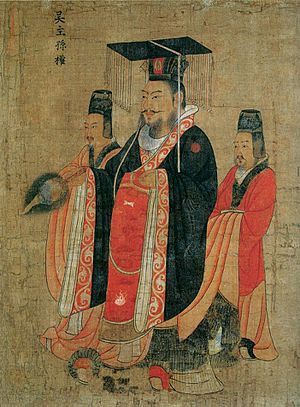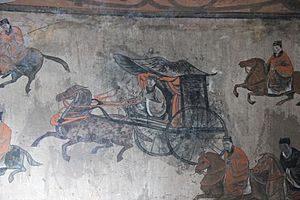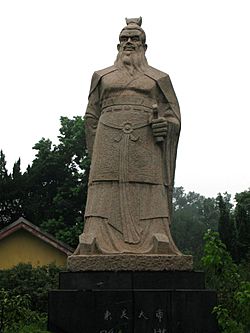Sun Quan facts for kids
Quick facts for kids Emperor Da of Wu吳大帝 |
|||||||||||||||||
|---|---|---|---|---|---|---|---|---|---|---|---|---|---|---|---|---|---|

Tang dynasty portrait of Sun Quan by Yan Liben
|
|||||||||||||||||
| Emperor of Eastern Wu | |||||||||||||||||
| Reign | 23 May 229 – 21 May 252 | ||||||||||||||||
| Successor | Sun Liang | ||||||||||||||||
| King of Wu (吳王) (as an independent ruler) |
|||||||||||||||||
| Reign | November 222 – 23 May 229 | ||||||||||||||||
| King of Wu (吳王) (as a vassal of Wei) |
|||||||||||||||||
| Tenure | 23 September 221 – November 222 | ||||||||||||||||
| Marquis of Nanchang (南昌侯) (under the Han Empire) |
|||||||||||||||||
| Tenure | December 219 – 23 September 221 | ||||||||||||||||
| Born | 182 Han Empire |
||||||||||||||||
| Died | May 21, 252 (aged 69–70) Jianye, Eastern Wu |
||||||||||||||||
| Burial | Purple Mountain | ||||||||||||||||
| Spouse |
|
||||||||||||||||
| Issue (among others) |
|
||||||||||||||||
|
|||||||||||||||||
| Dynasty | Eastern Wu | ||||||||||||||||
| Father | Sun Jian | ||||||||||||||||
| Mother | Empress Wulie | ||||||||||||||||
| Sun Quan | |||||||||||||||||||||||||||||
|---|---|---|---|---|---|---|---|---|---|---|---|---|---|---|---|---|---|---|---|---|---|---|---|---|---|---|---|---|---|

Sun's name in Traditional (top) and Simplified (bottom) Chinese characters
|
|||||||||||||||||||||||||||||
| Traditional Chinese | 孫權 | ||||||||||||||||||||||||||||
| Simplified Chinese | 孙权 | ||||||||||||||||||||||||||||
|
|||||||||||||||||||||||||||||
Sun Quan (182 – 21 May 252) was a very important leader in ancient China. He founded the Eastern Wu kingdom, one of the three main states during the Three Kingdoms period. His courtesy name was Zhongmou. After he died, he was known as Emperor Da of Wu.
Sun Quan took over control of his family's lands in the year 200, after his older brother, Sun Ce, passed away. He ruled as the King of Wu from 222 to 229. Then, he declared himself Emperor of Wu and ruled until 252. Sun Quan was younger than his rivals, Cao Cao and Liu Bei. He was known for being flexible in his foreign policy, always trying to do what was best for his country.
Sun Quan was born when his father, Sun Jian, was a government official. After his father died, Sun Quan and his family lived in different cities. His brother, Sun Ce, built a strong area in the Jiangdong region. When Sun Ce was killed in 200, Sun Quan, who was only 18, became the new leader.
He had strong support from his brother's trusted officers like Zhou Yu and Zhang Zhao. With their help, Sun Quan grew his power along the Yangtze River. In 207, his forces defeated Huang Zu, a military leader who controlled the middle Yangtze.
Contents
Becoming a Great Leader
Sun Quan's Early Years and Rise to Power
The ancient book Records of the Three Kingdoms says that Sun Quan was a descendant of Sun Tzu, who wrote The Art of War. Sun Quan was born in 182. His father, Sun Jian, was a low-ranking official. Sun Quan was the second son of Sun Jian and Lady Wu.
When the Yellow Turban Rebellion started in 184, Sun Jian joined the fight. His family moved to different places for safety. After his father died in 191, Sun Quan's family moved again. His older brother, Sun Ce, joined an army and sent the family to live with their uncle.
Sun Quan grew up helping his brother conquer lands south of the Yangtze River. At just 14, in 196, he became a county magistrate. He kept getting more important jobs from his brother. Sun Quan was good at finding and keeping loyal followers, like Pan Zhang and Zhou Tai. People started to compare his fame to his father's and brother's.
Taking Over After His Brother
In 200, Sun Ce was killed. Before he died, he trusted the 18-year-old Sun Quan to his loyal officers. Sun Quan was very sad, but Zhang Zhao told him to put on his military uniform and visit the areas his brother controlled.
Many thought Sun Quan was too young to lead. But Zhang Zhao and Zhou Yu saw his potential and stayed to help him. Zhang Hong also returned to assist Sun Quan. Cao Cao, a powerful warlord, gave Sun Quan the title of General Who Attacks Barbarians.
Sun Quan listened to his mother's advice. He trusted Zhang Zhao and Zhang Hong for civilian matters. For military issues, he relied on Zhou Yu, Cheng Pu, and Lü Fan. He also looked for talented young men to advise him, like Lu Su and Zhuge Jin. Sun Quan was known for finding good people and trusting them with important tasks.
For several years, Sun Quan focused on expanding his territory. He fought against the Shanyue, hill tribes in southern China. In 206, he captured over 10,000 men from them. He also continued to fight Huang Zu, who had killed his father. In 208, Sun Quan finally defeated and killed Huang Zu, gaining more land.
Major Battles and Alliances
The Battle of Red Cliffs

In late 208, after Liu Biao died, Cao Cao led a huge army of about 220,000 soldiers to conquer the south. He wanted to unite all of China. Some of Sun Quan's advisors suggested surrendering to Cao Cao. But Zhou Yu and Lu Su strongly disagreed.
Sun Quan decided to fight Cao Cao on the Yangtze River. He formed an alliance with Liu Bei and Liu Qi. Zhou Yu and Huang Gai came up with a clever plan. They pretended to surrender to Cao Cao. Then, they set their ships on fire and crashed them into Cao Cao's fleet.
Cao Cao's ships were mostly destroyed by the fire. His army had also been weakened by a plague. Cao Cao had to retreat, and many of his soldiers were defeated by Sun Quan and Liu Bei's forces on land. This was a huge victory for Sun Quan.
Working with Liu Bei
After Cao Cao's defeat, Sun Quan took control of the northern part of Jing Province. Liu Bei took the southern part. To make their alliance stronger, Sun Quan's younger sister, Lady Sun, married Liu Bei.
Zhou Yu worried about Liu Bei's true intentions. He suggested that Sun Quan should keep Liu Bei under house arrest. But Sun Quan thought Liu Bei's forces would rebel if he did that, so he refused. Sun Quan also gained control over Jiao Province. He moved his main base to Moling, which he renamed Jianye, to better control the Yangtze River.
In 213, Cao Cao attacked again at Ruxu. Sun Quan led 70,000 men to defend the city. His general, Lü Meng, had built strong fortresses. Cao Cao tried to cross the river, but Sun Quan's ships destroyed his navy. The war was a stalemate. Sun Quan even sailed a ship into Cao Cao's camp to observe them. Cao Cao was impressed by Sun Quan's discipline. Eventually, Cao Cao had to retreat because of the coming spring rains.
In 214, Sun Quan attacked Wan County, which Cao Cao was trying to rebuild. Lü Meng, Gan Ning, and Ling Tong quickly captured the city. Later, Liu Bei refused to return Jing Province to Sun Quan. Sun Quan sent Lü Meng to attack southern Jing Province, capturing several commanderies. A war almost broke out between them.
However, Liu Bei heard that Cao Cao was planning to attack Hanzhong. So, Liu Bei made a peace treaty with Sun Quan. They agreed to divide the land along the Xiang River. Sun Quan then attacked Hefei, but it was a difficult campaign, and he was almost captured.
In 217, Cao Cao attacked Ruxu again with a large army. Sun Quan defended the city with 70,000 men, leaving Lü Meng in command. After weeks of fighting, Lü Meng's defenses held strong, and Cao Cao had to retreat due to floods.
Sun Quan realized he couldn't defeat Cao Cao's large army alone. So, in 217, he made an alliance with Cao Cao. He recognized Cao Cao as the leader of the Han government. This meant Sun Quan was officially a subordinate, but he still ruled his lands independently.
Breaking Alliances and Becoming Emperor
The End of the Sun-Liu Alliance
In 219, Guan Yu, a general under Liu Bei, attacked Fancheng. Sun Quan saw this as a chance to strike. He was angry because Guan Yu had often caused trouble and even seized Sun Quan's food supplies. Sun Quan attacked Guan Yu from behind. Guan Yu's forces collapsed, and he was captured and executed. Jing Province came under Sun Quan's control, ending the alliance with Liu Bei.
After Cao Cao died in 220, his son, Cao Pi, forced the emperor to give up the throne. Cao Pi then started the state of Cao Wei. Sun Quan didn't immediately join Wei or declare independence. Meanwhile, in 221, Liu Bei declared himself emperor, starting the state of Shu Han. Liu Bei immediately planned to attack Sun Quan to get revenge for Guan Yu.
Fearing attacks from both sides, Sun Quan became a vassal of Wei. Cao Pi's advisor suggested attacking Sun Quan with Shu, but Cao Pi refused. Instead, in 221, he made Sun Quan the King of Wu.
Becoming Emperor of Wu
In 222, Sun Quan's general Lu Xun defeated Liu Bei at the Battle of Xiaoting. This stopped Shu's attacks. Later that year, Cao Pi demanded that Sun Quan send his son, Sun Deng, as a hostage to Wei. Sun Quan refused and declared his independence. He changed his era name, officially making Eastern Wu a separate state.
It wasn't until May 229 that Sun Quan formally declared himself emperor. Cao Pi launched a major attack on Wu, but Wu forces easily defended themselves. After Liu Bei died later that year, Zhuge Liang, who was ruling for Liu Bei's son, re-established the alliance with Sun Quan. The two states remained allies against Wei.
Ruling as Emperor
Early Years as Emperor
Sun Quan's early rule as emperor was very efficient. He was good at listening to advice and giving important jobs to the right people. For example, he trusted Lu Xun and Zhuge Jin so much that he gave Lu Xun a special imperial seal. Lu Xun could revise letters to Shu's emperor if needed before sending them. Sun Quan treated his top officials like friends, and they worked hard for Wu.
He also knew who was right for which job. In 225, when choosing a chancellor, he didn't pick Zhang Zhao, even though many respected him. Sun Quan felt Zhang Zhao's strong opinions would cause too many conflicts. He also promoted Lü Fan, even though Lü Fan had reported his spending habits when Sun Quan was young. Sun Quan knew Lü Fan did it out of loyalty.
In 224 and 225, Cao Pi attacked Wu again, but Wu forces easily pushed them back. Cao Pi even said, "Heaven created the Yangtze to divide the north and south." However, Sun Quan also found it hard to launch major attacks on Wei.
In 226, Sun Quan gained more control over Jiao Province. Several independent kingdoms in Southeast Asia also became Wu's vassals. In 226, a merchant from the Roman Empire visited Sun Quan's court. Sun Quan asked him about his home country.
A big victory for Wu happened in 228. Sun Quan's general Zhou Fang pretended to surrender to Wei. This tricked the Wei general Cao Xiu, who led a large army south. Cao Xiu walked into a trap set by Zhou Fang and Lu Xun and suffered heavy losses.
In 229, Sun Quan declared himself emperor. This almost broke the alliance with Shu, as some Shu officials felt it was a betrayal of the Han dynasty. But Zhuge Liang kept the alliance strong with a new treaty. They promised to help each other and divide Wei if they conquered it. Sun Quan then moved his capital to Jianye.
Challenges in the Middle Years
In 230, Sun Quan's rule started to face problems. He sent generals Wei Wen and Zhuge Zhi with 10,000 soldiers into the East China Sea. They were looking for the legendary islands of Yizhou and Danzhou, possibly Taiwan or Ryukyu. Many of the soldiers died from illness, and Sun Quan executed the generals, blaming them instead of himself.
In 232, Sun Quan had another problem. He sent generals to buy horses from Gongsun Yuan, a nominal Wei vassal. His advisor Yu Fan warned him it would fail, and it did. The generals were killed by Wei forces. Sun Quan regretted exiling Yu Fan, who died in exile.
The next year, Gongsun Yuan offered to become Sun Quan's subject. Sun Quan was very happy and sent 10,000 men to help Gongsun Yuan fight Wei. However, Gongsun Yuan betrayed them, killing Sun Quan's officials and seizing their troops. Sun Quan was furious and wanted to attack Gongsun Yuan himself, but he eventually calmed down. He even apologized to Zhang Zhao, who had warned him.
In 234, Sun Quan attacked Wei's city of Hefei. He hoped to draw out Wei's forces and attack them. But Wei generals simply let Sun Quan besiege Hefei. Sun Quan had to withdraw when his food supplies ran low.
In 238, Gongsun Yuan was attacked by Wei's general Sima Yi. Sun Quan considered helping Gongsun, hoping to take advantage if Sima Yi struggled. But Sima Yi quickly defeated Gongsun Yuan, so Sun Quan didn't launch an attack. That year, he also executed Lü Yi, who had been abusing his power. He wrote a letter to his top officials, blaming himself for problems and asking them to speak honestly.
In 241, Sun Quan launched his last major attack against Wei. But he rejected a strategy to attack Wei on four fronts with Shu. The campaign failed.
Later Reign and Succession Issues
In 241, Sun Quan's crown prince, Sun Deng, died. This caused a big problem with who would rule next. It also seemed to affect Sun Quan's health and judgment. In 242, he named his son Sun He as the new crown prince.
However, Sun Quan also favored another son, Sun Ba, and gave him the same staff as the crown prince. Many officials warned that this would make Sun Ba compete with Sun He, but Sun Quan didn't listen. Their relationship got worse, and Sun Ba started trying to take Sun He's place.
Sun Quan's daughter, Sun Luban, spread rumors, making Sun Quan blame Sun He's mother, Consort Wang, who died in fear. Sun Quan also stopped Sun He and Sun Ba from seeing officials who supported them. When Lu Xun tried to help Sun He, Sun Ba falsely accused him. Sun Quan got angry and scolded Lu Xun, which caused Lu Xun to die from frustration.
In 250, Sun Quan was tired of Sun Ba's constant attacks on Sun He. He made Sun Ba take his own life. He also removed Sun He as crown prince and made his youngest son, Sun Liang, the new crown prince. Many officials who opposed this, including Sun Quan's son-in-law Zhu Ju, were executed.
Around this time, Sun Quan also had his generals destroy dikes near the Wei border. This caused floods to stop potential attacks from Wei.
In 251, Sun Quan made Sun Liang's mother, Consort Pan, his first empress. Later that year, he realized Sun He was innocent and wanted to bring him back from exile. But his daughter Sun Luban and Sun Jun persuaded him not to. Sun Quan was very old, almost 70. He chose Zhuge Ke, Zhuge Jin's son, to be the future regent for Sun Liang. He had doubts about Zhuge Ke's arrogance, but most people thought Zhuge Ke was the right choice.
In 252, Empress Pan was murdered. On May 21, 252, Sun Quan died at age 70. His son, Sun Liang, became the new emperor. Sun Quan was buried in August or September 252 at Purple Mountain in Jianye.
Family
- Empress Pan, of the Pan clan (潘氏, d. 252)
- Sun Liang (會稽王 孫亮, 245 – 260), seventh son
- Empress Bu, of the Bu clan (步氏)
- Princess Quan (全公主/全主, 229 –258), first daughter
- Married Zhou Xun (周循), son of Zhou Yu
- Married Quan Cong (錢塘侯), Marquis of Qiantang
- Princess Zhu (朱公主/朱主), third daughter
- Married Zhu Ju, Marquis of Yunyang (朱據 雲陽侯)
- Married Liu Zhan (劉纂)
- Princess Quan (全公主/全主, 229 –258), first daughter
- Empress Dayi, of the Wang clan (大懿皇后 王氏)
- Sun He (南陽王 孫和, 224–253), third son
- Empress Jianghui, of the Wang clan (敬懷皇后王氏)
- Sun Xiu (吳景帝 孫休, 235 – 3 September 264), sixth son
- Consort Zhong, of the Zhong clan (仲姬仲氏)
- Sun Fen (齊王 孫奮, d. 270), fifth son
- Consort Xie, of the Xie clan (谢姬 谢氏)
- Sun Ba (魯王; d. 250), fourth son
- Furen Xie, of the Xie clan (謝夫人 谢氏)
- Furen Xu, of the Xu clan (徐夫人徐氏)
- Furen, of the Yuan clan (袁夫人 袁氏)
- Furen, of the Zhao clan (趙夫人 趙氏)
- Unknown
- Sun Deng (宣太子 孫登, 209 – May or June 241), first son
- Second Princess
- Sun Lü, Marquis of Jianchang (建昌侯 孫慮, 213 – February 232), second son
Era names
- Huangwu (simplified Chinese: 黄武; traditional Chinese: 黃武; pinyin: Huángwǔ; Wade–Giles: Huang-wu) 222–229
- Huanglong (simplified Chinese: 黄龙; traditional Chinese: 黃龍; pinyin: Huánglóng; Wade–Giles: Huang-lung) 229–231
- Jiahe (Chinese: 嘉禾; pinyin: Jiāhé; Wade–Giles: Chia-ho) 232–238
- Chiwu (simplified Chinese: 赤乌; traditional Chinese: 赤烏; pinyin: Chìwū; Wade–Giles: Chih-wu) 238–251
- Taiyuan (Chinese: 太元; pinyin: Taìyuán; Wade–Giles: Tai-yuan) 251–252
- Shenfeng (simplified Chinese: 神凤; traditional Chinese: 神鳳; pinyin: Shénfèng; Wade–Giles: Shen-feng) 252
See also
 In Spanish: Sun Quan (emperador Da de Wu) para niños
In Spanish: Sun Quan (emperador Da de Wu) para niños
- Lists of people of the Three Kingdoms
- List of Chinese monarchs


